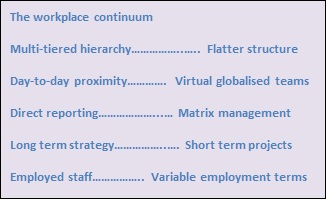The notion of ‘career’, as a concept, is changing across the world of work. Careers used to be pretty straight-forward, a linear, hierarchical journey with planned stops along the way. But today’s career is more like an open-ended ticket to anywhere you choose to go. You may accumulate a satisfying portfolio of projects or experiences without an official change in title or promotion. Lateral moves, development, growth in one’s own job and special projects – are all considered part of ‘career development’ today.
Career remains an important recipe for success; it is not just about keeping employees on board and winning a ‘Best Employer’ award. It is about having the right talent in the right place at the right time to ensure organisational performance for today and tomorrow.
Workplaces today all sit on a continuum. With this diversity of environments it can be challenging to find clarity around messages for employees concerning their careers.

Following our latest global research report Career 2014, we have coined the phrase ‘Navigating Ambiguity’, as the career landscape is changing and growing more ambiguous, career strategies need to adapt.
From the employer’s perspective, developing people is paramount to maintaining future competitiveness, but difficult when roles and required skills are evolving quickly. The need to be nimble makes it very challenging to plan people’s development, create definitive career paths, or make long-term commitments.
From an individual’s perspective, relying primarily on one’s current employer to provide opportunities or a clear career path is a thing of the past. It is well understood that the best options for career growth, professional satisfaction and job security reside in building skills and experiences that make the individual highly valued. Interestingly, career stagnation is not an issue; 88% of people increasingly believe that it’s okay to stay in the same job role – as long as there is still an opportunity to develop and learn new things.

In fact, based on 2,000 responses worldwide:
- Only 41% expect their employer to provide clear career paths.
- A slim 24% know what their employer wants their next job to be.
- Just 28% are confident their next career move will keep them with their current employer.
Both employers and employees understand there can be no guarantees. The tools and resources required to effectively manage a career keep on evolving. So where do you focus your efforts? Best practice suggests that the goal is to be prepared, yet remain nimble:
- Build skills and experiences; don’t focus on fixed roles and hierarchies.
- Enable flexibility in workforce planning and be prepared to juggle things on the ground. Allow individuals to suggest roles they might take on, rather than solely expect ‘management’ to work out what is needed.
- Develop an organisational approach of adapting as you go: allow managers and team members to collaborate to allow roles to evolve. Take on temporary assignments to get the work done, and develop skills and experiences to take the organisation forward.
- Have individuals equipped and prepared to jump in quickly when opportunities arise. But do be aware that a quick change means that there is a real risk of people jumping into jobs that turn out to be a bad fit. Individuals need to think and plan in advance about what type of opportunities will allow them to best deploy their skills and talents to the best advantage of the company and their own career ambition as well.
Employees need to own their career journey. They need to understand what they want – which is often the hardest part – and workout what destinations might be a good fit for them, depending on their talents, interests and values. They then need to take the initiative to develop or get advice and make the right choices. If your organisation is not supporting their career development and they are not having the conversation with you, they will be having it with someone, somewhere else.





